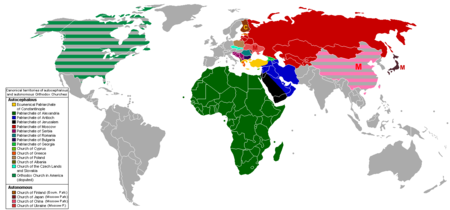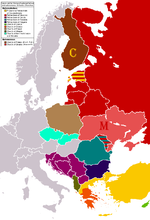Autocephaly
Autocephaly (literally "self-headed") is the status of a Local Church within the Orthodox Church whose primatial bishop does not report to any higher-ranking bishop. Autocephaly is granted when an ecumenical council or a high-ranking bishop, such as a patriarch or other primate, releases an ecclesiastical province from all obligations to any higher authority within the Orthodox Church, while remaining in full communion with the bishops of that province. Historically, autocephaly was obtained in a variety of ways. There are controversies regarding which historical methods of obtaining autocephaly represent a normative precedent to be followed in the future and which methods represent special exceptions.
Church usage
Autocephaly refers to those Churches which are not, in any way, dependent upon any other Church, or Churches, for their life and mission. On the other hand, each and every Local Orthodox Church, regardless of its particular status, is responsible for the faith and life of the others. Therefore any action of any Church is subject to the review of the others in reference to its doctrine, morality, sacramental practices, and canonical order. This is just as each and every Orthodox Christian is responsible for each other.
History
Autocephaly is a developed practical concept in the Orthodox Church. That is, it is not part of the original organization of the Church but developed over time for practical reasons. Though many arguments are put forth regarding how autocephaly is properly obtained, the historical and canonical record shows a good deal of variation.
In Antiquity, certain areas developed for various reasons into self-governing Churches, with groups of bishops organizing themselves into synods or councils with a primate. These self-governing areas were then confirmed in their position by the others and recognized as such.
Some were simply recognized according to tradition (i.e., "small t" tradition), meaning that the bishops of certain prominent cities in the Roman Empire were recognized as primates over the surrounding regions, by virtue of the size of those cities, the importance and influence of the Christians living in them, and the tradition of honor accorded to them:
- The Church of Rome
- The Church of Constantinople
- The Church of Alexandria
- The Church of Antioch
In other cases, autocephaly was granted by an Ecumenical Council:
- The autocephaly of the Church of Cyprus was recognized at the Third Ecumenical Council (431).
- The Church of Jerusalem was declared a Patriarchate with primacy in its area (over the claims of the bishop of Caesarea) at the Quinisext Council (the council "in Trullo", in 692), which established the canons of the Sixth Ecumenical Council .
Sometimes, autocephaly was granted by one mother Church to a daughter Church:
- In 466, the Church of Antioch elevated the bishop of Mtskheta to the rank of Catholicos of Kartli, thus making the Church of Georgia autocephalous.
- The Orthodox Church in America received autocephaly from the Church of Russia in 1970 (though that action is still not formally recognized by many of the other autocephalous Churches).
- The Orthodox Church of Ukraine received autocephaly from the Church of Constantinople in 2019 (though that action is still not formally recognized by many of the other autocephalous Churches).
But there were also cases in which two different Churches both claimed to be the mother Church of the same daughter and both granted autocephaly to that same daughter Church, at different times:
- The Church of Poland received autocephaly from the Church of Constantinople in 1924. This was not recognized by the Church of Russia. The Church of Russia granted a separate tomos of autocephaly to the Church of Poland in 1948.
- The Church of the Czech Lands and Slovakia received autocephaly from the Church of Russia in 1951. This was not recognized by the Church of Constantinople. The Church of Constantinople granted a separate tomos of autocephaly to the Church of the Czech Lands and Slovakia in 1998.
In some cases, autocephaly was simply declared by the Church in question and then eventually recognized by the others:
- The Church of Russia declared autocephaly from the Church of Constantinople in 1448 because the Russian Metropolitan appointed by Constantinople had accepted the Union of Florence and converted to Catholicism. In 1589, Russian autocephaly was recognized by the four Patriarchs existing at the time, and the Metropolitan of Moscow was also proclaimed a Patriarch, fifth in rank behind the others.
- The Church of Greece declared autocephaly from the Church of Constantinople in 1833, following the Greek Revolution against Ottoman rule. The autocephaly of the Church of Greece was only recognized by Constantinople in 1850, and a tomos was granted at that time.
- The Church of Romania declared autocephaly from the Church of Constantinople in 1865. There were strong protests from Constantinople, but Romanian autocephaly was recognized in 1885.
- The Church of Albania declared autocephaly from the Church of Constantinople in 1922. This was recognized by Constantinople in 1937.
And finally, there have been Churches that received autocephaly, then lost it (by being incorporated into other Churches), then received autocephaly again. It is a matter of controversy whether it is legitimately possible to abolish autocephaly after it has been granted, or whether "losses" of autocephaly represent abuses of power:
- The Church of Bulgaria received autocephaly from the Church of Constantinople in 927, then was re-incorporated into the Church of Constantinople in the 11th century, then declared autocephaly again in 1186 (recognized in 1235), then lost autocephaly again, then was declared autocephalous by a decree of the Ottoman Sultan in 1872. This created a canonical mess condemned at a council in Constantinople in 1872 (by way of condemning phyletism), which was eventually sorted out decades later. Bulgarian autocephaly was recognized by Constantinople for the third time in 1945.
- The Church of Serbia received autocephaly from the Church of Constantinople in 1219, but the Ottoman Turkish authorities prevented the Serbs from electing a Patriarch between 1463 and 1557, then abolished Serbian autocephaly entirely in 1766 (incorporating the Serbian flock into the Church of Constantinople). The Church of Serbia received autocephaly again from Constantinople in 1879.
- The autocephaly of the Church of Georgia (originally granted in the 5th century by Antioch) was abolished by the Imperial Russian authorities in 1811 (after Georgia had been annexed by Tsarist Russia). The Church of Georgia later declared autocephaly again in 1917. This restoration of autocephaly was recognized by the Church of Russia in 1943 and by the Church of Constantinople in 1989.
New autocephalous Churches
Regardless of how a Church becomes autocephalous, the normal and historical procedure for a new autocephalous Church is to be formally recognized as autocephalous by the Church of which it was originally a part (the "mother Church"). Following that, it is to be formally recognized by all of the other Orthodox Churches in the world. This does not require the blessing of any single particular bishop and certainly not an official gathering of an Ecumenical Council.
See also
External links
- Unity and Autocephaly: Mutually Exclusive?, by Dr. Lewis J. Patsavos, a canonist at Holy Cross Greek Orthodox School of Theology (Brookline, Massachusetts)
- The Origins and Authority of the Ecumenical Patriarchate of the Orthodox Church, by Demetrios J. Constantelos
- A Letter To The Ecumenical Patriarch Concerning The Situation Of The Diaspora, by Patr. Alexei II (Ridiger) of Moscow
- Questions and Answers on Autocephaly, an apologia for the OCA's autocephaly by Fr. Thomas Hopko (1971)
- The Path to Autocephaly and Beyond: "Miles to go before we sleep", a reflection on the OCA's autocephaly by Metropolitan Theodosius (Lazor) of Washington, its former primate (1995)
- Agreement on the Autocephaly for the Orthodox Church in America, Agreement made by Russian Orthodox Church, Moscow Patriarchate, and the Russian Orthodox Greek Catholic Church of America
- The Role Of The Protos Or Primate In The Church Of Greece, a presentation given by Metropolitan Christodoulos of Demetrias (later Archbishop of Athens) to the VIII International Congress of the Society ïn Canon Law of the Eastern Churches.

